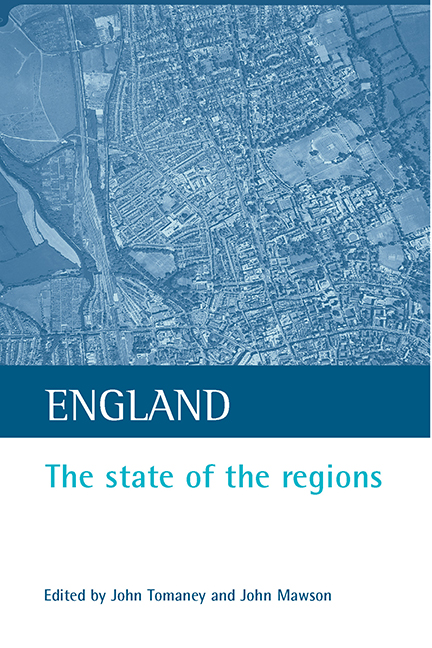Book contents
- Frontmatter
- Contents
- List of tables and figures
- Acknowledgements
- List of contributors
- one Introduction
- two Regional government in England: reviewing the evidence base
- three New Labour and the evolution of regionalism in England
- four Yorkshire (and the Humber)
- five Institutional collaboration in the West Midlands region
- six England's North West
- seven The South West
- eight Regionalism in the East of England
- nine The South East region?
- ten Regionalism in North East England
- eleven Regional strategy development in the East Midlands
- twelve The problem of regional governance
- thirteen Elected regional government: the issues
- fourteen Barnett plus needs: the regional spending challenge in Britain
- fifteen Conclusion: prospects for regionalism
- Index
- Also available from The Policy Press
twelve - The problem of regional governance
Published online by Cambridge University Press: 20 January 2022
- Frontmatter
- Contents
- List of tables and figures
- Acknowledgements
- List of contributors
- one Introduction
- two Regional government in England: reviewing the evidence base
- three New Labour and the evolution of regionalism in England
- four Yorkshire (and the Humber)
- five Institutional collaboration in the West Midlands region
- six England's North West
- seven The South West
- eight Regionalism in the East of England
- nine The South East region?
- ten Regionalism in North East England
- eleven Regional strategy development in the East Midlands
- twelve The problem of regional governance
- thirteen Elected regional government: the issues
- fourteen Barnett plus needs: the regional spending challenge in Britain
- fifteen Conclusion: prospects for regionalism
- Index
- Also available from The Policy Press
Summary
Introduction
The debate about the reform of the governance of the English regions has tended to hinge on two related assumptions. The first of these is that an extensive tier of government exists within the English regions in the form of a plethora of government departments, quangos and other bodies. To a greater or lesser degree, the policies and actions of these agencies are assumed to provide the framework for regional development. The second assumption is that the fragmented structure of bodies at the regional level contributes to a failure of governance which produces poor public policy outcomes (see NECC, 1999; NEA, 2001). The fragmented character of the policy-making process – together with arguments about the democratic deficit – are the lynchpin of the case for the reform of regional governance in England. Advocates of elected Regional Assemblies, however, have tended to assume rather than demonstrate the existence of governance failure in the English regions. Recently the structure and performance of this existing tier of regional governance has come under more scrutiny in the light of evolving debates about regional governance (for an earlier analysis of regional government, see Hogwood, 1982).
This chapter aims to contribute some empirical detail to the debate about regional governance. It seeks to describe the evolving pattern of governance in the English regions, highlighting emerging and likely future trends. It draws on a detailed study of the patterns and processes of regional governance in North East England. Firstly, however, it begins with an examination of some recent contributions to the debate about regional governance in England.
Joining up: governance failure in the English regions?
… initiative de coordination gouvernementale pour simplifier la vie des personnes et des entreprises. (French rendering of ‘joined-up’ government, cited in The Guardian, 13 March 2001)
The alleged deficiencies of governance in the English regions were the subject of research commissioned by the Cabinet Office, which examined the role of central government at the local and regional level. The background to the study carried out by the Performance and Innovation Unit (PIU, 2000) was the government's concern to achieve ‘joined-up’ government; that is to improve the capacity of government to address strategic, cross-cutting issues and promote innovation in the development of policy and in the delivery of the government’s objectives (Cabinet Office, 1999).
- Type
- Chapter
- Information
- EnglandThe State of the Regions, pp. 159 - 172Publisher: Bristol University PressPrint publication year: 2002

